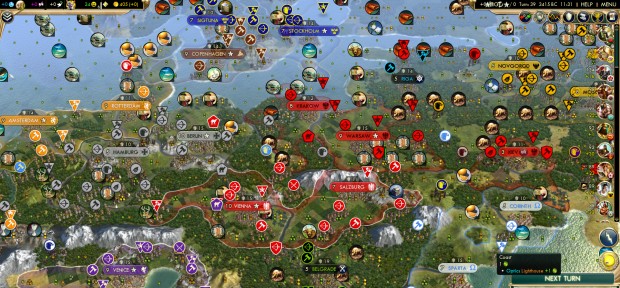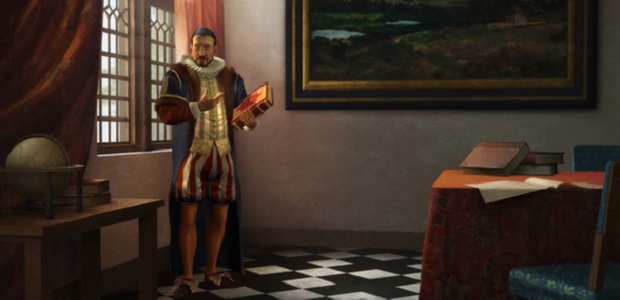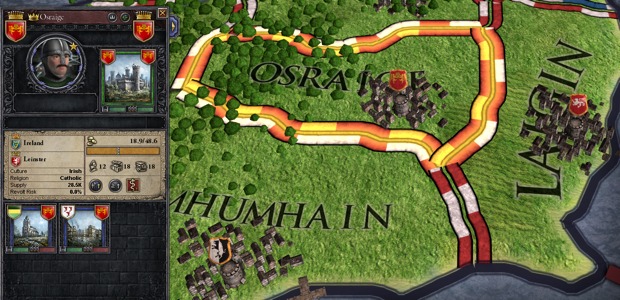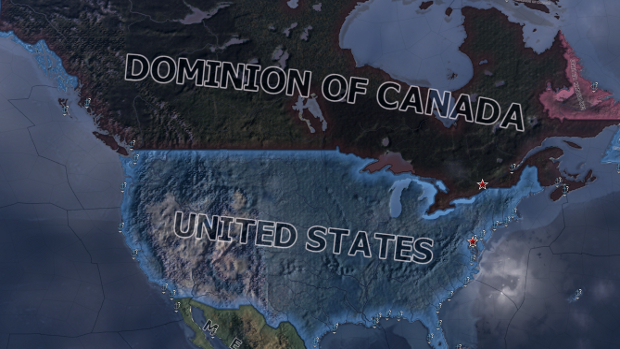Jon Shafer on designing Civilization 5, joining Paradox and making strategy games better
Master of maps
Jon Shafer was 21 years old when he became lead designer of Civilization V. Now working at Paradox on an unannounced project and on his own historical strategy game At The Gates in his spare time, he says he's learning from the likes of Spelunky along with the more obvious strategic influences. We spoke about how the second half of every Civ sucks, the part the series played in his life, the perils of boredom in strategy design, how much we love maps, and what the future holds for both Shafer and Paradox.
I began by asking how he ended up sitting at the Paradox Convention, in Stockholm, the city that has now been his home for two weeks: "It's quite a long story, actually."
That story begins in Denver, around 2003.
"Back then, I was a big fan of Civilization II and III, but also EU II and Hearts of Iron I. Obviously all of those numbers have gotten a lot bigger since then (laughs). At that point in time, like a lot of people here, I was just excited to play the games and be involved in some way.
"I'd always wanted to make games from when I was very young, so I made a lot of little games on the side, but once I started playing these more sophisticated strategy games I decided I wanted to start making mods for them rather than just building my own things. With Civ III there was a map editor, which was developed during that period, and I think I might have been the first person to make a map using that editor outside of Firaxis."
This didn't come about because Shafer had any existing connection with the studio. There was no closed alpha to sign up for back then. Instead, he just dived into the editor as soon as it was released.
"It was released after the game. They didn't have it ready in time to ship but they released it around six months later and I was so into Civ III and... maps are my thing. It's funny looking back now because it was always so obvious really." We'll come back to this. "So I was waiting for this thing to come out and so excited, which meant I was right there when it released and I pounced on it. No special access, I just grabbed it as soon as possible.
"With Hearts of Iron there was AI scripting that was open for modding as well, and I took it upon myself to dig through it. AI in Hearts of Iron maybe wasn't as good as people might like, so I figured I'd tinker with it and see if I could make the AI a bit stronger, so I spent some time doing that. That was my introduction to Paradox, and that's when I first met people like Johann [Andersson, Paradox Development Studio manager] on the forums."
Fast forward to Firaxis. This involves a slight detour because going from making maps and AI script modding to leading the design of the fifth entry in the most important strategy game series in the world isn't an obvious path.
"I grew up in the Denver area and I moved out to Baltimore for an internship at Firaxis around 2005. That was a more interesting move than the recent Stockholm one because I didn't know anyone! I was 19 when I started, didn't know anyone and didn't know anything. Obviously things worked out."
The internship came about when Shafer started commenting on code from afar.
"I'd done beta testing so I knew Soren (lead designer of Civilization IV) through the forums, but the way that I stood out was that during that beta test, as a young ambitious lad I took it upon myself to comment the Python scripting system that existed in the game. No one at Firaxis wanted to do that so I wrote a big long guide about the use of Python in the game, which is probably still online somewhere [it is].
"Soren and the other folks over at Firaxis saw it and thought it was pretty cool so they figured I might be able to do more. I had already been bugging them for a job and they decided to offer me an internship and see what came of it. When I started, I didn't have any professional design experience and I could program but I wasn't a very good programmer - I'm still not! I'm not an engineer, put it that way. I've written a lot of code that makes real engineers and architects go "OOOHHH NO" because it's so bad.
"At that point in time the programming lead didn't really know what to do with me so they had me comment Soren's code. He doesn't comment his own code, or at least he didn't back then so they were just kind of, "Figure out what he's doing"."
That wasn't all Shafer got up to during his internship though. As he describes it, being the lead on a project like Civ, at a company like Firaxis, requires a degree of oversight. The lead is expected to get their hands dirty in all areas, from coding to the broader strokes of the design, and even during his internship Shafer showed he had the curiosity and skills to tackle a project from several angles.
Frustrated with the real world Civ IV maps that were disproportionate, he spent some time figuring out how to make a bitmap converter utility that took an image and imported it into Civ IV as a map. This let players download a map online and import it into the game.
"From there, I got into the design area by making maps and scenarios. At that point, Firaxis were making the Civ IV expansion Warlords and they asked me to make some scenarios for that, realising I might be useful for more than commenting code (laughs).
"Then I was using what programming skill I did have to try and add value to the project and they kept giving me more and more responsibility, and it kept working out. When it came time to do Civ V, Soren was somebody that they tapped to do that project again, I believe."
One Civ is enough for a lifetime though.
"I don't know it's true for everybody, but I think every designer has maybe one Civ in them (laughs). Maybe Ed [Beach, Civ VI designer] will break that and make Civ VII in a few years time."
From commenting code to driving across the country for an internship, to building scenarios - and then to the offer of a lead designer position on the sequel to the game he'd just interned on. It must have been intimidating?
"I didn't really think about it at the time! I think about it more now that I'm older, but when I was named lead on Civ V, I was still only 21 and I didn't really think much about the grander scope of "what does this mean?" "what is this for?" I just wanted to make a cool game. I figured that's what I did - I made games and I had the opportunity to do something with this one.
"Part of it was just being in the right place at the right time. The company was a lot smaller back then. Now it's maybe 150 people but then it was closer to 40. There are only so many people who can jump into the role of leading a team, being in charge of the design, being in charge of the AI programming, and being the gatekeeper for a project. Not many people can wear all of those hats.
"Of course, it's an exceptional amount of work. The way Firaxis is structured, the model is very much like Sid works. From the very beginning, Sid made the game - he wrote the code, he designed it, he made a lot of the art, he did the music - he basically made it almost by himself. That's changed over time, of course, but at the core you still have the person who is in charge of that game and there aren't a lot of design documents or meetings. You get in there, you try something out. Does it work? Yes. Well, then make it better. Does it not work? Get rid of it and make something else.
"Sid's was a very hands-on model and that's carried forward into present day Firaxis. Each game has its own lead, in the Sid role. The problem is that these games are so big and complex and hard to make that it's an extremely exhausting process to go through, and it lasts for a period of three or four years. Every company has a different model and many don't need that gatekeeper role.
"FPS and RPG studios don't necessarily need that one person with total oversight, but strategy is rule-based and has these emergent elements, which makes it important to have that one person who is a lead designer and director, but also hands-on. Someone who can see all the moving parts and understand how they fit together. Strategy design tends to work through iteration. You get there because you make something, figure out all the ways it sucks, then try to fix those things. Now you're a little closer and you start the process again, pulling it apart and trying to fix even more things. You can go through three versions of a system in a single day."
When Shafer talks about his time on Civ V, he seems equally energised and exhausted by the style of working: "It puts a lot of pressure on that one person in the lead role. And I got the role by just happening to be in the right place at the right time. I knew Civ, I was a programmer, I had ideas and... I worked too much. So they're like, "this guy has the work ethic we need!""
On the actual design of Civ V, there's one important question I have to ask before we move on to Shafer's current projects. It seems fairly clear that the single unit per tile mechanic was the core part of Shafer's design from the very beginning, and he agrees.
"That was the core of the game, and I'd say it's for better and it's for worse. If I were to make another Civilization game - which probably isn't going to happen - I'd go back to stacks of units. As a designer I try to be flexible, I try to adapt... there's never one correct answer. The question isn't whether stacking or single unit per tile is a better design, the question is "what does the unit stacking or the lack of it do to the game as a whole?"
"That's a version of Civ that exists now and a lot of people love it. But it has its pluses and minuses. I'd want to do something completely different now. In fact, I'd like to do a Civ game that focuses much more on supply systems, so that if you stack two units on one pile, you'll suffer attrition. You don't react to the stacking as we did in V by removing it, you figure out ways to make it work better than it had previously.
There's another strategy game pattern that bothers me and though it's not unique to Civ, the empire that Sid built contains a strong example of it. Rather than breadth or depth, which the loops touch upon, this is about the length of a game and, more specifically, the trend of a player's role through the beginning, middle and end. From 4,000BC to the end of recorded history, the graph of your story in Civ tends to be on a fairly steady ascent. You move toward the end of history and you're almost always moving forward. This isn't necessarily true in games like EU IV and CK II, where the structure can accommodate peaks and troughs.
Again, this is something that Shafer has been thinking about.
"I think if you can have a game that can do those ups and downs, it's better. In a broad sense. One problem with a game like Civ is that if things go wrong, the temptation to quit is very strong because failing isn't fun and recovery isn't always possible.
"That rise and fall is an ideal to strive for. But I think it'd be very difficult to build a Civ like that because the basic structure goes strongly against it. The Paradox games avoid it but they do that as much because they're concentrating on specific areas and eras rather than covering all of history. You could have a Paradox grand strategy game that spans all of history from 4000 BC to 2100 AD or whatever, and you'd run into a lot of the same problems that Civ has.
"Civ has always had this issue. It's very easy to get into a formulaic position and that is a a kind of death knell for many games. This actually touches on one of my big criticism of Don't Starve. As much as I love the game, the first half hour of every playthrough is exactly the same. You're running around collecting carrots and berries, setting up a base. It's the same loop over and over at the start of every game.
"By contrast, games like Civilization have the opposite problem. The early game is the interesting bit: what's the map like, what are my opportunities, what shall I focus on. And then it gets into more of a formulaic place from there.
"It's interesting that one of the games I just mentioned starts one way and opens up, and the other starts open and becomes narrow. The ideal is to be interesting from the beginning to the end! That's my goal."
He laughs. There's very little in the way of ego evident. Shafer isn't telling me, or himself, that he can fix any of these problems; he seems happy enough to identify them and at least be aware that steps can be taken to correct them. I barely ever finish games of Civ, often tapping out once I've finished discovering the map and started to fill it. Shafer lets me in on the big Civ secret.
"Nobody finishes games of Civ! Nobody does! That's the biggest challenge that Civ has: trying to make the game work and be fun from turn 1 to turn 500. Turn 1 to turn 200 is great, but turn 200 to 500 hasn't been all that great in any Civ game.
"The reason it's such a challenge is that you're trying to map history onto this game and the fun part of 4X games is in the two first Xs. Exploration and Expansion. In almost every 4X game you're done with those two things around half-way through. The Exploitation is less interesting because you're not getting a lot of new things, you're just adding to the stockpile you already have. So you're losing the most enjoyable 60% of the game by half-way through. I'm not sure any Civ has figured out what to do with the second half of the game."
This sounds like a structural problem as much as a specific mechanical problem. If Civ tracks history, the exploration age is going to finish long before the end of the game. If history itself is a structural disadvantage, is Shafer tempted to leave history behind?
"For grand strategy games, I absolutely believe there's room to grow outside history, yes. Paradox started that with Stellaris and I think there's probably more room to do that here. We'll see where we go though."
The future is in flux. Later, Fred Wester, Paradox's CEO, told me he wasn't even sure what Shafer would be working on, or if it had been decided yet. He was very clear that he'd wanted to hire Shafer for a long time though, to add to his "super-group" of strategy designers.
"It's true. They have been trying to get me here for a long time now," says Shafer. "Fred has been trying to get me here since at least 2010, 2009 or so. They flew me out here back in October and I started officially a couple of weeks back. It was a long process to figure out what would happen with At The Gates, and how we'd build a team and what the project might be.
"This seemed like the right time because Paradox is in a different place than it was in 2010. A lot of that is on the publishing side, with Skylines and Pillars of Eternity, where success has given them a lot of money and flexibility. That can feed back into the strategy games, where they want to be making interesting things beyond Hearts of Iron, CK and EU. A lot of the reason I accepted the job comes down to people though. There are a lot of companies I wouldn't work for - I'm not going to name any names - but everyone I've met here is great.
"This move was much easier than that move to Firaxis back when I was a kid because I knew so many people at Paradox already. Last week they had the intro day for all the new people and I was in there, and they had a number of people from the management team talking about the Paradox values and how things are structured, the history of the company... and I knew all of the presenters and most of the material. That's a good feeling!
"The people of Paradox are great and I don't say that just because I'm doing some kind of PR thing right now. I wouldn't have come here if I didn't already believe it. Making games is always going to be stressful - you butt heads and disagree sometimes - but the people here care about each other as well as the quality of the games. And they try not to lay people off unless it's absolutely necessary, by avoiding short-term projects with no follow-up."
What, then, does he want to make here? The answer is vague because even if any upcoming title weren't a secret, there's no title to divulge at the moment. There's a possible clue in the games that Shafer has been playing those roguelikes and King of Dragon Pass, and his final comment on where strategy games can grow.
"I think one of the big opportunities for strategy games right now is to add more character. Both in the form of characters but also in the form of what I've talked about already - the variety in the world, the flavour of encounters. Sometimes things that you find in the world can be great, sometimes they can be disappointing, but they should always be unpredictable."







